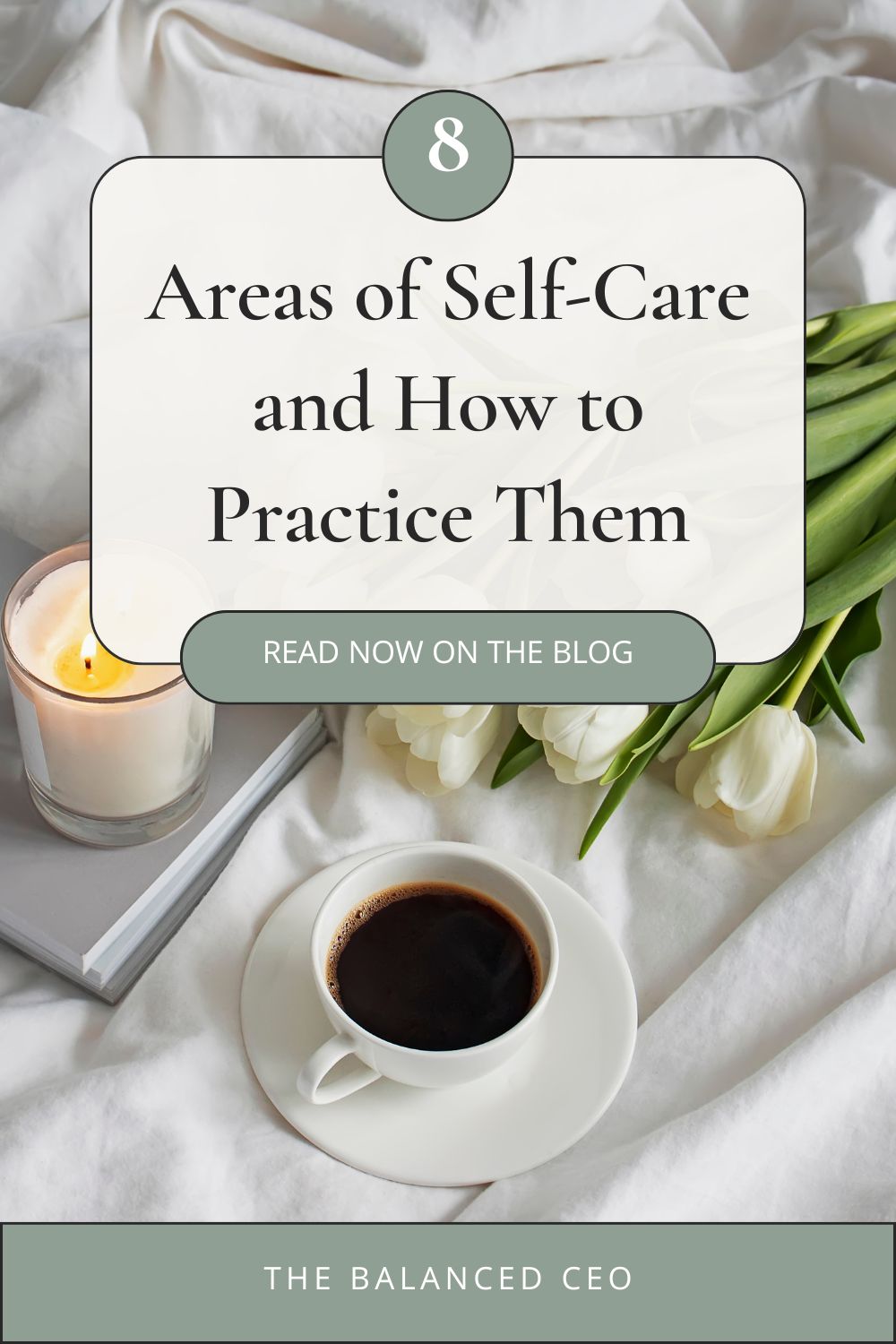This post may contain affiliate links, which means I’ll receive a commission if you purchase through my links, at no extra cost to you. Please read full disclosure for more information.

Self-care has evolved far beyond the superficial interpretations often seen on social media. It’s more than just bubble baths and spa days. While relaxation practices certainly play a role, authentic self-care involves a sophisticated approach to maintaining mental, physical, emotional, and spiritual equilibrium.
The concept of self-care can be divided into eight essential areas. Here’s a detailed explanation of each and how you can incorporate them into your routine for long-term wellness.
1. Physical Self-Care
Caring for your body is essential for your overall health and energy levels. Physical self-care involves regular activity, proper nutrition, and ensuring your body gets the rest it needs to function well.
Here’s how to achieve physical self-care:
- Move your body with activities you enjoy — walking, yoga or even dancing for at least 30 minutes daily.
- Eat balanced meals that nourish you from the inside out and maintain proper hydration levels.
- Ensure you get the recommended average of seven hours of sleep each night.
- Stay on top of regular check-ups with your doctor.
2. Emotional Self-Care
Emotional intelligence begins with self-awareness and develops through intentional practices. Even though understanding and processing emotions requires dedicated time and space, once you master this aspect of self-care, you create healthy outlets for your feelings and learn how to be kind to yourself — even when times get tough.
For sustainable emotional health, establish regular check-ins with yourself. This might involve journaling or conversations with trusted confidants or a therapist. Engaging in mindfulness practices like meditation can help calm your mind and body — especially when you’re stressed.
When you develop healthy emotional boundaries, you safeguard your mental space, enabling you to foster authentic connections with others.
3. Mental Self-Care
Cognitive stimulation helps sustain mental acuity, which promotes lifelong learning and keeps age-related cognitive decline at bay. This is why maintaining mental well-being is essential for people of all ages.
Mental self-care involves challenging one’s intellect while maintaining healthy thought patterns. Regular engagement in learning activities strengthens neural connections, which in turn enhance problem-solving abilities.
Look for ways to expand your knowledge through structured learning experiences, whether it be an online course, a weekend class or workshop participation. Engaging in mental exercises, from strategic games to creative pursuits, has been shown to promote cognitive flexibility. So, find some you like and give your brain the boost it needs.
4. Social Self-Care
Because humans are wired for connection, social self-care focuses on nurturing your relationships and maintaining a healthy social life. Quality interactions provide support, stimulation and opportunities for personal —and professional — growth. The focus should remain on nurturing relationships that enhance your life while setting appropriate boundaries with those that don’t.
Cultivate your social network through regular, meaningful interactions. You can start by making time for your loved ones. A simple coffee date or phone call can do wonders for maintaining friendships. Surround yourself with people who uplift and energize you and don’t be afraid to set boundaries with those who drain your energy. If you feel isolated, consider joining a community group or participating in activities that interest you.
5. Environmental Self-Care
Your surroundings significantly influence mental clarity and emotional stability. A well-organized, peaceful environment promotes focus and reduces your susceptibility to stress. The key lies in creating spaces that support your well-being and reflect your values.
Start by organizing your home, workspace and surroundings. A clutter-free environment can promote a sense of calm. If your home still feels overwhelming when everything is organized, try making some upgrades to bring a peaceful feeling to your home. For example, white elements like cabinets or countertops can make your kitchen feel clean and sleek. Light colors in general make a room feel bigger, which can help you relax better.
Outside of your home, consider spending more time in nature, whether at the park, the beach or on a hike. Or add plants to your space to reap their physical and mental benefits, including improved air quality and better mood. Most importantly, be mindful of your environmental impact by recycling and minimizing what you throw away. The smallest of adjustments can yield significant improvements in your daily experience.
6. Spiritual Self-Care
Spiritual self-care is about connecting to something larger than yourself — through religion, nature or your inner values. It’s a way to find purpose and meaning in your life.
To develop this dimension of self-care, consider doing the following:
- Engaging in meditation or prayer to connect with your inner self.
- Reading spiritual or philosophical texts that resonate with you.
- Practicing yoga or deep breathing exercises to ground your spirit.
- Participating in meaningful rituals like charity work.
The aim is to find effective ways to regularly reflect on your life’s direction and purpose to preserve your spiritual alignment.
7. Financial Self-Care
Financial self-care is about managing your money to support your goals and lessen your money worries. So, work toward building financial stability to enable you to enjoy life.
To hack this area of self-care, you need to develop a comprehensive financial strategy that includes budgeting, saving and planning for the future. Start by setting a budget that works for you and your lifestyle. Monitor your spending to stay on track and avoid impulsive purchases that go against your financial goals. Setting aside money for savings, even if it’s just a little each month, can help you feel more secure about the future.
Don’t hesitate to seek professional financial advice if you need extra guidance.
8. Professional Self-Care
Career satisfaction impacts overall well-being whether you like to admit it or not. Professional self-care involves maintaining boundaries, pursuing growth opportunities and engaging in work that aligns with your values and goals.
Establish clear work-life boundaries and set goals to pursue professional development opportunities. Create an organized, efficient workspace that promotes productivity while minimizing burnout and conduct routine assessments of your career goals to evaluate your progress and maintain professional satisfaction.
Finding Balance in Your Self-Care Routine
Incorporating all eight areas of self-care may feel overwhelming, but it’s one of the most important things you can do for your well-being. The key is to start small and focus on what resonates most with you. Maybe you’ll begin by adding more physical activity to your week or setting up a decluttering day for your home. Whatever your choice, taking care of yourself in every aspect allows you to radiate from within and be ready for whatever life throws your way.
Remember, sustainable change materializes through consistent, manageable adjustments rather than dramatic overhauls. So, focus on progress rather than perfection, adjusting your approach as needed. With dedication and awareness, these practices will become natural elements of your daily life, supporting your journey toward comprehensive well-being.

Cora Gold
Contributor





Leave a Reply